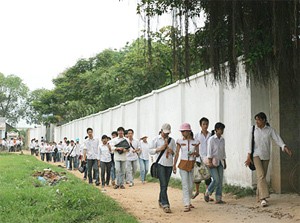Deputy PM and Minister of Training and Education Nguyen Thien Nhan has announced a hike in tuition fees at all levels of schooling. How can this decision do anything to improve the standard of education in Viet Nam?

According to the World Bank’s 2006 World Development Report, only two percent of the Vietnamese population can afford a full 13 years of formal education, indicating that our country lags far behind much of the region in this regard.
Furthermore, only ten percent of young Vietnamese people aged between 20 and 24 attend university, lower than any other Asian country. The ratio is 15 percent in China, an impressive 41 percent in Thailand and a whopping 89 percent in South Korea.
Ironically, the number of students in Viet Nam is in inverse proportion to the national spending on education. Dr. Vu Quang Viet from the United Nations in New York points out that spending on education in 2005 in Viet Nam made up of 8.3 percent of the country’s GDP, higher than the 7.2 percent in the United States, 7.1 percent in Korea and 6.1 percent in France.
These are numbers that Viet Nam’s policy makers and educators should think long and hard about for the sake of education in this land.
At a recent press conference, Education and Training Minister Nguyen Thien Nhan disappointed many parents when he said tuition fees would go up again. The heartbreaking fact is that more children and young adults will have no choice but to drop out of school as their families cannot afford the higher cost.
Many educators here and abroad have protested against the decision. Professor Nguyen Xuan Han summed it up for many people when he said, “It is a principle that every institution should abide by that all students in elementary schools must be given a free education.”
Sharing Pro. Han’s view is Professor Pham Phu, a member of the National Education Council of Vietnam. “The government should increase tuition fees in a way that won’t bring tears to poor people!” he said.
Hoang Tuy, the renowned former professor of mathematics, was just as adamant. “Socialization of education does not mean that the government must place the burden on the people’s shoulders. The poor quality of education cannot be blamed on a lack of money,” he said.
A group of Harvard University professors who advise the ministry heaped coals on the fire by warning that the current crop of students in Viet Nam could not have the benefit of a good education because of the inappropriate curricula.
According to Professor Malcolm Gillis, chairman of the Vietnam Education Foundation (VEF), in the future there will be three kinds of nations: intelligent, more intelligent and most intelligent. The difference between them will depend on how each country invests in education.
Which of these three groups will Viet Nam belong to if we have to accept the fact that millions of people are doomed to illiteracy because they are poor?












